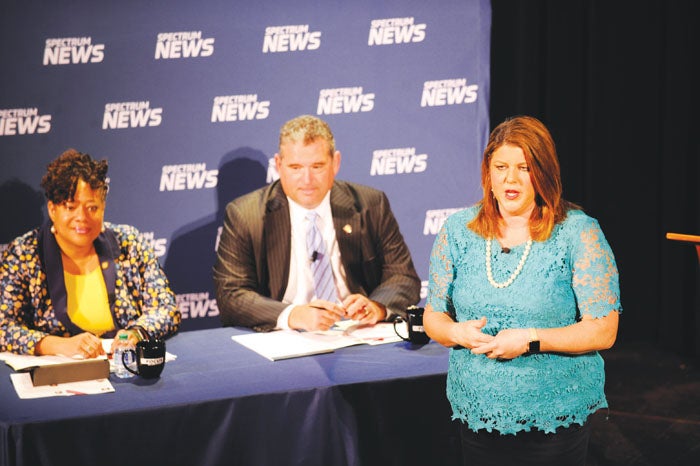Republicans, Democrats weigh voter ID amendment in Hometown Debate
Published 12:00 am Friday, October 5, 2018

- Spectrum News’ “In Focus” host Loretta Boniti explains Hometown Debate protocol as Sen. Erica Smith, D-3, and Rep. David Lewis, R-53, look on. Washington Daily News photo
By Vail Stewart Rumley
Washington Daily News
WASHINGTON, N.C. — A proposed amendment to the state constitution to require voters to present photo ID was the subject of the second of four Hometown Debates on Wednesday night at Arts of the Pamlico’s Turnage Theatre in downtown Washington.
The debate was the second in a series of four weighing the pros and cons of four of the six constitutional amendments that will appear on North Carolina ballots on Nov. 6
The debate panel included Donald Bryson, president and CEO of the Civitas Institute; Kareem Crayton, executive director of the Southern Coalition for Social Justice; state Rep. David Lewis of Harnett County, R-53; and state Sen. Erica Smith of Northampton County, D-3.
The first Hometown Debate was held Sept. 25 at the Meroney Theatre in Salisbury.
Wednesday’s debate was moderated by Spectrum News “In Focus” host Loretta Boniti. It will be broadcast at 11:30 a.m. and 8 :30 p.m. Sunday on the Spectrum News website, www.spectrumlocalnews.com.
Smith came down firmly against the amendment that would require voters to present a photo ID before voting at the polls, citing disenfranchisement of disproportionally minority voters.
She pointed to a Beaufort County case during the 2016 election in which 138 voters were challenged and removed from the roles, though they were qualified to vote. Of those removed, 96 were registered Democrats and 62 of the 96 were African-Americans, though they represent only 23 percent of registered voters.
Smith challenged the broad language of the amendment, saying it does not do enough to dispel fears that people with few resources would be able to obtain photo IDs.
“We need to make sure that we can specify the types of IDs that will be allowed and (make) a 100 percent effort that they can be acquired by those who cannot acquire them themselves,” Smith said.
Bryson, who stands in favor of the amendment, said most North Carolinians support stricter voter ID laws, as evidenced by polling by the Civitas Institute.
Bryson said North Carolina is an outlier because 34 other states require photo ID to vote, including all the neighboring states in the Southeast. He pointed to Georgia’s law as a good example because the state offers free photo IDs.
While he acknowledged that voter fraud is difficult to determine, he said the proposed amendment is a preventative measure.
“We want to fix the problem before it exists. Voter fraud does not have to be widespread,” Bryson said.
Ultimately, the issue is about what residents of North Carolina want, he said.
“People all across the state really want this amendment,” Bryson said. “I don’t think they’re wrong.”
Clayton also opposed the amendment, saying it is too broad and places too much confidence in a legislature that has struggled with the constitutionality of past vVoter ID and redistricting efforts.
“The ballot proposal here is essentially a blank check,” Clayton said. “While the public may be very comfortable with the concept, when we’re thinking about how to implement it as the legislature has created (it), they’re asking people to trust them. They’ve broken the law before.”
Clayton said the broad language of the amendment means voters could end up with a good law or bad one — one that does disenfranchise minority voters.
“We need to be exceedingly careful about what we’re getting when we’re changing an amendment,” Clayton said.
Lewis, a supporter of the amendment, said he believes its intent is to fully enable everyone eligible to vote to have that right. The to-be-written legislation will reflect that, he said.
“We will draft a law that will withstand constitutional scrutiny,” Lewis said.
Lewis said simply stating your name and address to identify oneself at the polls is not enough to prevent voter fraud and leaves openings for people to impersonate other voters. Requiring photo ID would prevent that, he said.
“Voter ID is constitutional. It is not an impediment to show you are who you say you are,” Lewis said.
Lewis said he supports free photo IDs and assisting voters with obtaining them.
“It’s a simple concept. If a person doesn’t have such an ID, we’ll find a way to get it to them,” he said.
The third Hometown Debate, to be held Tuesday in Clayton, will focus on an amendment that would change how appointments are made to the State Board of Ethics and Elections Enforcement.
The last is slated for Oct. 16 in Gastonia. The topic will be an amendment proposing a maximum 7 percent cap on the state’s income tax rate, as opposed to the current 10 percent cap.



